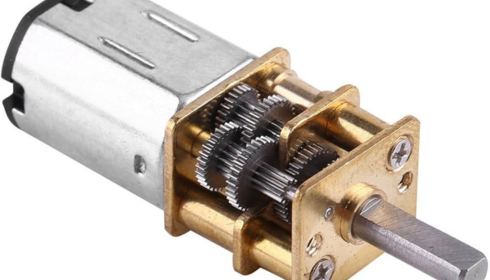A gear motor is an essential component in countless mechanical systems and machines across various industries. It combines a motor and a gear reducer into a single, efficient unit. The primary function of a gear motor is to reduce speed while increasing torque, allowing for enhanced performance and control in mechanical applications. Whether used in industrial machinery, robotics, or household devices, gear motors play a vital role in ensuring smooth and powerful operations.
What Is a Gear Motor?
A gear motor is a mechanical device that integrates a motor with a gearbox. The motor provides rotational power, while the gearbox modifies that power by adjusting speed and torque levels. Gear motors can be powered by AC (alternating current) or DC (direct current), depending on the application’s requirements.
The gear mechanism inside the motor reduces the output speed of the motor shaft, making it ideal for applications that require high torque at low speeds. This is especially useful in equipment that needs to lift, pull, or move heavy loads efficiently and reliably.
Types of Gear Motors
There are several types of gear motors, each designed for specific tasks and operational needs:
- Worm Gear Motors: Known for their high torque output and compact size, worm gear motors are often used in conveyor systems, lifts, and heavy-duty machinery.
- Planetary Gear Motors: These motors are extremely durable and efficient, making them suitable for robotics and precision equipment.
- Helical Gear Motors: Ideal for applications requiring quiet operation and smooth performance.
- Spur Gear Motors: Simple in design and cost-effective, they are commonly found in basic machinery and automation systems.
Each type of gear motor offers unique advantages based on its mechanical design and torque-speed characteristics.
Advantages of Using Gear Motors
Gear motors offer several benefits that make them a popular choice in various applications:
- High Torque Output: By reducing speed, gear motors increase torque, making them suitable for tasks requiring substantial force.
- Compact and Integrated Design: Since the motor and gearbox are combined, gear motors save space and are easier to install and maintain.
- Energy Efficiency: Gear motors are engineered to provide optimal performance with minimal energy consumption.
- Improved Control and Precision: Gear motors allow for better speed control, enhancing the accuracy and efficiency of automated processes.
- Durability and Longevity: High-quality gear motors are built to withstand tough working conditions and offer long service life.
Applications of Gear Motors
Gear motors are widely used in numerous industries due to their versatility and efficiency. Some common applications include:
- Industrial Automation: Used in conveyor belts, packaging machines, and assembly lines to provide controlled movement.
- Automotive Industry: Gear motors are used in power windows, seat adjusters, and windshield wipers.
- Medical Equipment: In devices such as electric beds, surgical tools, and mobility aids.
- Home Appliances: Washing machines, garage door openers, and electric mixers all utilize gear motors for efficient operation.
- Agriculture: Gear motors drive equipment like automated feeders, irrigation systems, and tractors.
Choosing the Right Gear Motor
Selecting the appropriate gear motor depends on various factors such as the required torque, speed, load capacity, power supply, and environmental conditions. It’s crucial to consider these aspects to ensure the motor performs efficiently and meets the application’s demands.
Partnering with a reputable gear motor manufacturer can also provide custom solutions tailored to specific requirements. Proper installation and regular maintenance are key to extending the lifespan of a gear motor and maintaining optimal performance.
Conclusion
Gear motors are a fundamental part of modern machinery and play a critical role in various sectors. Their ability to deliver high torque at low speeds makes them indispensable for tasks that require power and precision. Whether for industrial use or household applications, a gear motor offers reliability, efficiency, and versatility.




